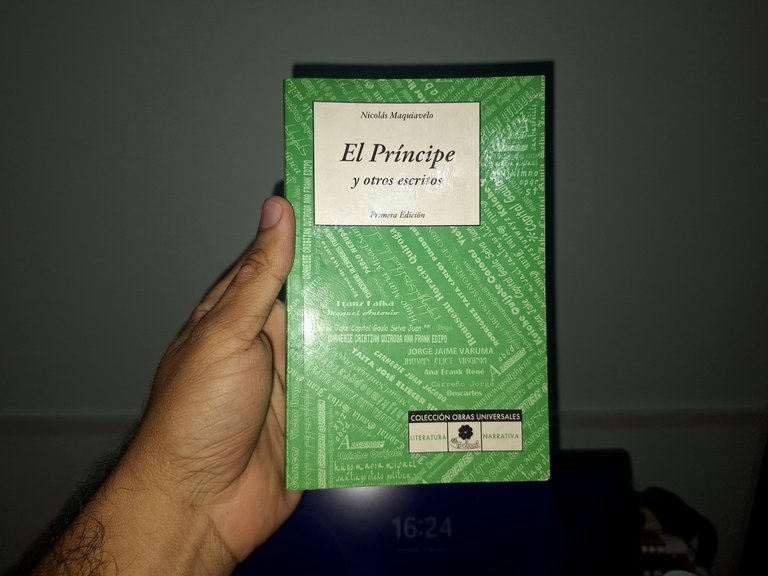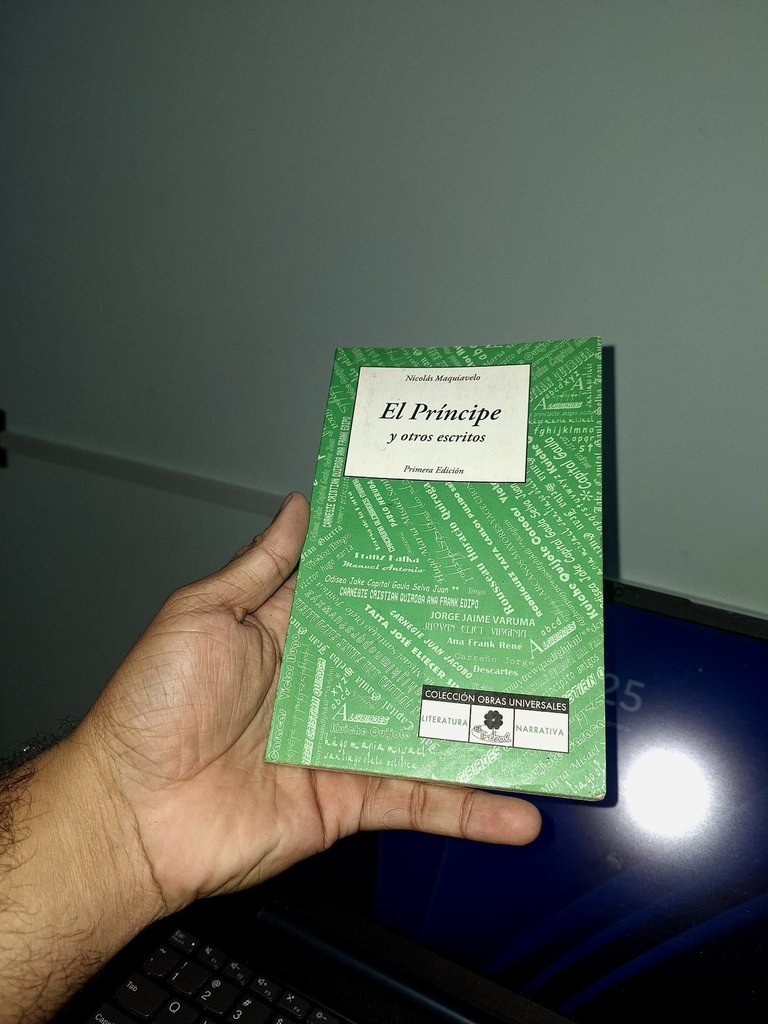
I decided to write this review because of the events happening in Venezuela. "The Prince" by Machiavelli was one of the first books I read when I was studying at university, specifically in the school of legal and political sciences. I tend to reread it when there is a political or managerial situation.
The book, which for some may be interpreted as a prelude to the formation of tyrants, is, in fact, a text with philosophical, political, economic, and literary perspectives that goes beyond simplicity.
Machiavelli explores the forms of the state from a unique perspective. Unlike others, he states that there are only two systems for a state: a republic and a principality. This contrasts with the view of authors like Jean-Jacques Rousseau, who argues that the state has three forms: monarchy, aristocracy, and democracy.
You might think it’s a boring book, but honestly, The Knight in the Rusty Armor is even more boring. Mainly because of the differentiation and the objective of the book. It all depends on the vision your mind wants to feed. At the beginning, I claimed that it is a book to be read and analyzed in a managerial context due to the prerogatives it presents to solve conflicts.
The narrative, as it progresses, establishes notable real-life examples that allow a visualization of behavior and clearly explains how to respond to a situation that puts the principality at risk. Machiavelli’s The Prince does not analyze the republic but rather the monarchical model, to be more precise.
One of the most controversial chapters is number III, where he talks about mixed principalities. This is one of the chapters that interests me the most due to its position on controlling arms and how to handle betrayal: crush it before it grows and divide any divergence that generates instability in governance.
Coincidentally, this is something that has happened in Venezuela: prerogatives have been created to divide the opposition, infiltrators have been inserted to implode it from within, and the armed forces have been demoralized to submit them to a single principle: the tyranny of autocracy.

Mixed principalities are unions of states or can also be analyzed as dual governance. This prerogative technically works to compare how power can be crushed by authoritarianism or lack of legitimacy. The same happens in leadership: a vice president or internal president against a CEO who suddenly acquired the company’s shares. The dispute starts at that point. The book forces the reader to conduct a deep analysis of each situation.
Another devastating chapter is titled "On Severity and Clemency: It is better to be loved than feared." This is one of the most interesting chapters, grounded in reality, and it can be compared with many examples. Severity is necessary, but if it is disproportionate, you will be hated, and betrayal will begin. Some tyrants and dictators didn’t read this chapter.
If the prince makes himself feared, he must also make himself loved. The same applies to a leader, a creator, a manager, or a president. Fear is part of leadership’s ability to respond according to available means to appease dissent, but that doesn’t mean it should be crushed. It must be romanticized. This is what Machiavelli technically implies: it’s not about being indulgent, but about being correct. Disproportion creates nothing desirable; this is how betrayal happens.
The chapter that, without a doubt, is my favorite is XIX, titled "On How One Must Avoid Being Despised and Hated." This is an intriguing aspect that I often use in my personal life. Machiavelli is precise in this chapter when he says that the prince must avoid being hateful and despised.
There’s a part in this chapter that reflects the current reality of Venezuela: at all costs, one must avoid usurping the properties of the governed. When this happens, obviously, repulsion and hatred grow. As long as it’s not stolen or there’s a belief that it hasn’t been deprived, people will live happily (this is what technically happened in Venezuela from 1999 to 2012). There was a false happiness on the streets, but people’s property was usurped without affecting the initial belief. That changed afterward; nothing mattered anymore.
Machiavelli's The Prince is an outward expression of any model of government and leadership. If you or anyone hasn’t read it, it’s simply a lack of personal awareness or perception. It’s a really short book that always allows for a proper analysis of the hardest circumstances in life, the environment, work, the economy, and politics.

For me, it’s not a hard book to read. If there’s something that’s not understood, it can be Googled or, if the word is too technical, one can look it up in a dictionary. The book, far from being an idealistic personification, is a guide to form and learn how to respond to adverse situations. By the way, nowhere in the book does it state that the end justifies the means. This is merely a conclusion that the reader may reach after deeply analyzing the text.
Original content by @neruel. All rights reserved ©, 2025. Images: Samsung Galaxy A50. English translation and grammar correction: Chatgpt - DeepL - Languagetool.
SPANISH VERSION (click here!)
Lecciones de Poder: Maquiavelo y el Juego del Control | Review [En-Es]
Decidí escribir esta reseña debido a los acontecimientos que están sucediendo en Venezuela. “El Príncipe” de Maquiavelo fue uno de los primeros libros que leí cuando estaba estudiando en la universidad, específicamente en la escuela de ciencias jurídicas y políticas. Suelo releerlo cuando hay una coyuntura política o gerencial.
El libro, que para algunos puede ser interpretado como un preámbulo para la formación de tiranos es, más bien, un texto con perspectivas filosóficas, políticas, económicas y literarias que va más allá de la simplicidad.
Maquiavelo explora las formas del Estado desde una perspectiva única. A diferencia de otros, él establece que existen solo dos sistemas para un Estado: República y Principado. Esto es contrario a la postura de autores como Jean-Jacques Rousseau, quien establece que el Estado posee tres formas: monarquía, aristocracia y democracia.
Puede que pienses que es un libro aburrido, pero sinceramente, “El Caballero de la Armadura Oxidada” es aún más aburrido. Principalmente, por la diferenciación y el objetivo del libro. Todo depende de la visión que tu mente desee alimentar. Al inicio, sostuve que es un libro que se lee y analiza en el ámbito gerencial debido a las prerrogativas que plasma para resolver conflictos.
La narrativa, a medida que avanza, establece notables ejemplos reales que permiten obtener una visualización del comportamiento y deja por sentado cómo se debe responder ante una coyuntura que ponga en riesgo al Principado. “El Príncipe” de Maquiavelo no hace un análisis de la República, sino del modelo monárquico, para ser más exactos.
Uno de los capítulos más controvertidos es el número III, donde habla sobre los principados mixtos. Este es uno de los capítulos que más me llama la atención debido a su postura sobre el control de las armas y cómo se debe manejar la traición: aplastarla antes de que crezca y dividir cualquier divergencia que genere inestabilidad en la forma de gobernar.
Casualmente, esto es algo que ha sucedido en Venezuela: se han creado prerrogativas sobre la oposición para dividirla, se han insertado infiltrados para implosionarla desde su interior y se ha desmoralizado a las fuerzas armadas para someterlas a un solo principio: la tiranía de la autocracia.
Los principados mixtos son uniones de Estados o también pueden analizarse como doble gobernabilidad. Esta prerrogativa funciona técnicamente para comparar cómo el poder puede ser aplastado ante el autoritarismo o la falta de legitimidad. En el liderazgo sucede de la misma manera: vicepresidente o presidente interno frente a un CEO que adquirió repentinamente las acciones de la empresa. La disputa comienza en ese punto. El libro somete al lector a un análisis profundo en cada situación.
Otro capítulo que es demoledor es el titulado: “De la severidad y clemencia: vale más ser amado que temido”. Este es uno de los capítulos más interesantes, sujetos a la realidad, y que se puede comparar con muchos ejemplos. La severidad es necesaria, pero si es desproporcionada, serás odiado y la traición comenzará. Algunos tiranos y dictadores no leyeron este capítulo.
Si el príncipe se hace temer, también debe hacerse amar. Lo mismo aplica para un líder, para un creador, un gerente o presidente. El miedo es parte, en sí mismo, de la capacidad del liderazgo para poder responder según los medios disponibles para apaciguar la disidencia, pero esto no quiere decir que deba ser aplastada. Se debe romantizar. Es lo que técnicamente da a entender Maquiavelo: no se trata de ser indulgente, sino de ser correcto. La desproporción no genera nada apetecible; así es como ocurre la traición.
El capítulo que, sin lugar a dudas, es mi favorito es el XIX, titulado: “De cómo debe evitarse ser despreciado y aborrecido”. Este es un aspecto intrigante que suelo usar en mi vida personal. Maquiavelo es certero en este capítulo al decir que el príncipe debe evitar ser odioso y aborrecido.
Hay una parte en este capítulo que refleja la realidad de Venezuela actualmente: a toda costa se debe evitar usurpar las propiedades de los gobernados. Cuando esto ocurre, evidentemente, la repulsión y el odio crecen. Mientras esto no sea robado o exista la creencia de que no se ha privado, la gente vivirá feliz (es lo que técnicamente ocurrió en Venezuela desde 1999 hasta 2012). Había una felicidad falsa en las calles, pero se usurpaba la propiedad de la gente sin que afectara la creencia inicial. Esto cambió después; ya nada importaba.
El Príncipe de Maquiavelo es una muestra de la exteriorización de cualquier modelo de gobierno y liderazgo. Si usted o alguien no lo ha leído, es simplemente una falta de noción o percepción personal. Es un libro realmente corto que siempre permite analizar correctamente las circunstancias más duras de la vida, el entorno, el trabajo, la economía y la política.
Para mí, no es un libro difícil de leer. Si hay algo que no se entiende, se puede googlear o, si la palabra es muy técnica, se puede buscar en un diccionario. El libro, lejos de ser una personificación idealista, es una muestra para formar y aprender a responder a situaciones adversas. Por cierto, en ninguna parte del libro se sostiene que el fin justifica los medios. Esto solo es una conclusión a la que el lector puede llegar al analizar profundamente el texto.
Contenido original de @neruel. Todos los derechos reservados ©, 2025. Imágenes: Samsung Galaxy A50. Traducción al inglés y corrección gramatical: Chatgpt - DeepL - Languagetool.
Posted Using INLEO
Congratulations @neruel! You have completed the following achievement on the Hive blockchain And have been rewarded with New badge(s)
Your next target is to reach 51000 upvotes.
You can view your badges on your board and compare yourself to others in the Ranking
If you no longer want to receive notifications, reply to this comment with the word
STOPThank you very much for this. : )
Que interesante este libro, creo que lo tengo en casa, no sabía de que trataba pero con tu resumen está más que claro!
Gracias por compartir! 🤗
Gracias a ti por pasarte. Deberías darle la oportunidad es perfecto para temas de liderazgo, marketing y posicionamiento de marca.
Me gusta que resaltes la importancia de los capítulos sobre la clemencia y severidad, así como la necesidad de evitar caer en el desprecio por parte del pueblo. Muy interesante.
¡Es bueno verte por aquí! Es un libro lleno de buen conocimiento. Creo que debes apostar por él. Ese capítulo puede ser visto desde el punto de vista político, pero también desde el punto de vista económico. El libro tiene varias vertientes.
Interesting story, thanks for the review
Thank you for stopping by.
Algo curioso es que ese libro no es lo que Maquiavelo pensaba: lo escribió en prisión para congraciarse con su captor (no recuerdo quién). Pero, aparentemente, lo que realmente pensaba sobre la política está en n¿una obra que escribió tanto antes como después del Príncipe, Discursos sobre la primera década de Tito Livio, en 3 volúmenes. O sea, que probablemente no le gustaría cómo su apellido se transformó en adjetivo
"vale más ser amado que temido"
John Long Silver logra ser ambas cosas en la serie Black Sails. Los guionistas tal vez se inspiraron en El príncipe